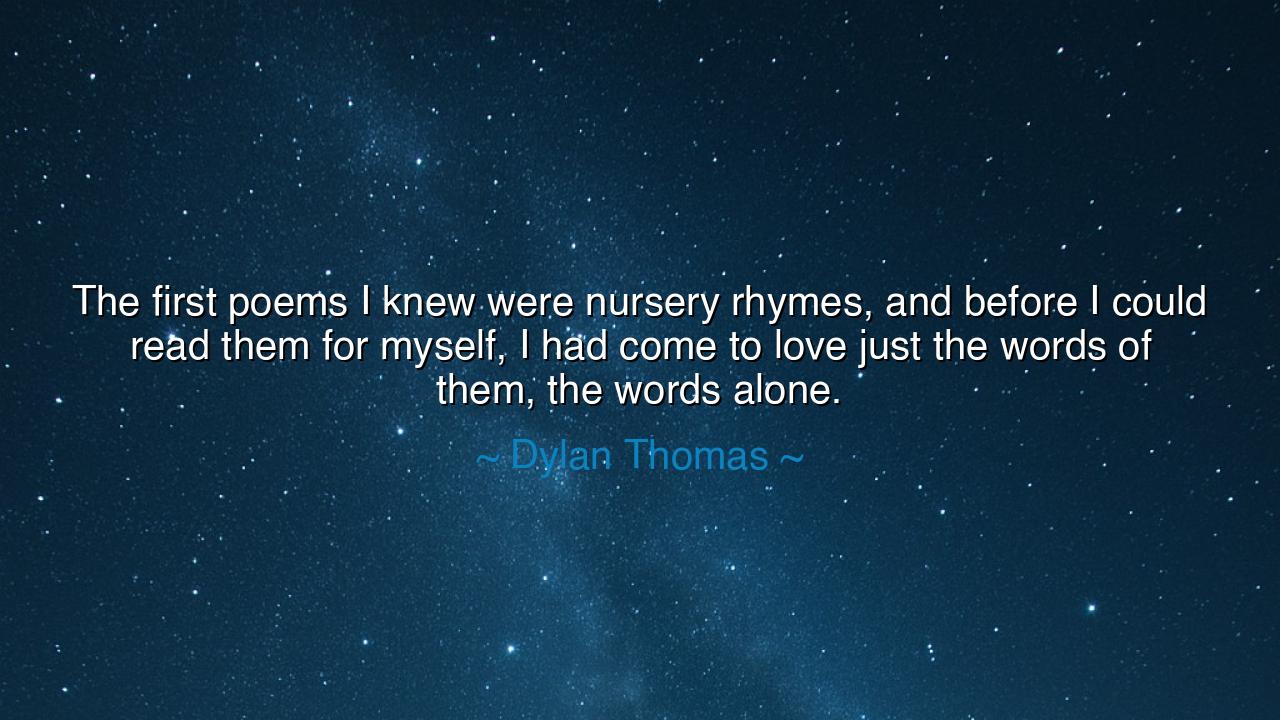
The first poems I knew were nursery rhymes, and before I could
The first poems I knew were nursery rhymes, and before I could read them for myself, I had come to love just the words of them, the words alone.






When Dylan Thomas said, “The first poems I knew were nursery rhymes, and before I could read them for myself, I had come to love just the words of them, the words alone,” he was not speaking merely of childhood or verse — he was revealing the soul’s first awakening to the power of language. For Thomas, the music of words came before their meaning. As a boy, he listened to the rhythm, the sound, the melody that lived within speech. Long before he could grasp what the words described, he felt their life, their beauty, their mysterious power to stir emotion. In that early wonder lies the seed of all poetry — the recognition that words themselves, when spoken with heart, are living things.
Born in Wales in 1914, Dylan Thomas grew up surrounded by the cadence of the English tongue and the rolling song of Welsh speech. His father was a schoolteacher, a man who filled his son’s ears with the sound of Shakespeare and the old poets. Yet Thomas discovered something greater than knowledge in those lessons: he discovered love for the sheer sound of words. Before understanding, before intellect, he felt joy in the rising and falling of syllables, in the dance of rhyme and rhythm. The child who loved the sound of language became the man who forged it into flame. His poems — fierce, musical, and luminous — carried that same primal energy, the echo of his first enchantment with “the words alone.”
This revelation — that sound precedes sense — is as ancient as poetry itself. The earliest bards and storytellers spoke their verses aloud, not to explain, but to enchant. The old chants of Greece, the psalms of the Hebrews, the hymns of India — all were born not from the intellect, but from the music of the spirit. Before men could write, they sang. Before they sought to understand, they felt. In this way, Thomas stands as a descendant of those ancient voices: he reminds us that words are not mere tools of logic, but instruments of the soul. Their power lies not only in meaning, but in resonance, in the vibration that touches the heart before the mind.
Consider the story of Homer, the blind poet who sang of Troy and the wrath of Achilles. His listeners did not follow him for clarity — they followed him for beauty. His voice, rising like the sea, carried them to a world beyond their own. The words themselves, their rhythm and cadence, transported his hearers into the realm of the divine. So too did the child Dylan Thomas listen to nursery rhymes — those simple songs of innocence — and feel something vast and ancient stirring within him. In their lilting tones and playful sounds, he heard the same music that moves through every age: the song of the human heart speaking to itself.
Thomas’s words remind us that language is not only a vessel of meaning, but an art in itself — a living force that shapes how we feel, dream, and remember. Too often, we treat words as mere carriers of thought, stripping them of their wonder. But to truly love language, as Thomas did, is to hear its heartbeat — to let the rhythm of speech move through us like wind through a harp. Even the simplest rhyme, spoken with care, contains a fragment of eternity. The child who listens to the sing-song of a nursery rhyme stands closer to the roots of poetry than the scholar who dissects it with analysis. For wisdom begins in wonder, and wonder begins in sound.
There is a lesson here for all who seek to create, to write, or to understand. If you would become a poet — or simply one who speaks with meaning — you must first fall in love with words. Not as servants, but as companions. Speak them aloud; hear their rhythm. Let them roll over your tongue as a river over stones. Read aloud the lines of those who came before you — Homer, Shakespeare, Blake, and Thomas himself — not to study them, but to feel them. For when you love the sound of words, meaning will come to you naturally, as music gives birth to emotion. The greatest truths are not told in definitions but sung in tones.
So, my children, remember this: words are sacred. They have the power to wound, to heal, to create, and to destroy. Use them as the ancients did — with reverence and joy. Listen before you speak, feel before you write, love before you understand. In doing so, you will touch the living spirit of language itself — the same spirit that moved through the young Dylan Thomas when he first heard his nursery rhymes echo in the dark.
For in the end, his wisdom is this: to love words for their own sake is to love life itself, for both are mysteries — rich, musical, and eternal. The world may fade, meanings may change, but the sound of a true word — spoken from the heart — will echo forever, carrying the soul of humanity through time, as it has since the dawn of speech.






AAdministratorAdministrator
Welcome, honored guests. Please leave a comment, we will respond soon